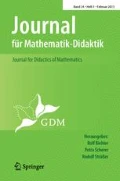Abstract
As an intensive explicit training in obtaining competence in problem-solving usually does not take place in math teaching in FRG, the authors focuses the performance of non-instructed problem-solver (students). Firstly, the paper offers an subjective description of various attitudes emphasizing problem-solving; subjective positions of the authors are fitted in. Hereby the aspect of a teaching regarding problem-solving is an integral part is characterized. These issues are then justified by the evaluations of 88 solutions to the so-called ‘lish-problem’ (grade 5 / grade 6). A final survey of the solutions will point out the difficulties of an integrative standardization of the students’ attempts, especially if such an analysis is based on a global approach via mathematical patterns.
Similar content being viewed by others
Literatur
Aebli, H.; u.a.: Sind Regeln des Problemlösens lehrbar? In: Zeitschrift für Pädagogik, Jg.32, Heft 5, 1986, 617–638
Blum; W.; Niss, M.: Mathematical Problem Solving, Modelling, Applications, and Links to Other Subjects — State, Trends and Issues in Mathematics Instruction. In: Modelling, Applications and Applied Problem Solving — Teaching Mathematics in a Real Context. ( Eds.: W. Blum / M. Niss / I. Huntley). Chichester: Ellis Horwood 1989, 1–21
Dörner, D.: Problemlösen als Informationsverarbeitung. Stuttgart, Berlin, Köln, Mainz: Kohlhammer 1976
Dörner, D.: Die Logik des Mißlingens. Rowohlt 1989
Fischer, R.; Malle, G.: Mensch und Mathematik. Mannheim: Wissenschaftsverlag 1985
Hallman, R.J.: Kreativität und Schule. 1971
Kretschmer, I. F.: Problemlösendes Denken im Unterricht. Frankfurt a.M. 1983
Kühl, J.: Emotion, Kognition und Motivation, Vol. ?: Die funktionale Bedeutung der Emotionen für das problemlösende Denken und für das konkrete Handeln. In: SPRACHE UND KOGNITION, Bd. 4 (1983), 228–253
National Council of Teachers of Mathematics, Yearbook 1980: Problem Solving in School Mathematics (Eds.: Stephen Krulik, Robert E. Reys)
Polya, G.: Schule des Denkens. Bern: Francke Verlag 1949
Polya, G.: Let us teach guessing. Etudes de Philosophie des Sciences, en hommage à Ferdinand Gonseth, 1950, 147–154. Editions du Griffon, Neuchatel
Polya, G.: Mathematik und plausibles Schließen. Basel: Birkhäuser Verlag 1963
Schoenfeld, A.: Mathematical problem solving. Orlando: Academic Press 1985
Siemon, H.: Ein geometrisches Beispiel zum problemorientierten Unterricht. In: Der Mathematikunterricht, 22, Heft 3, 1976, 77–90
Stowasser, R.J.K.: Materialien zum problemorientierten Unterricht ?. Zur Einführung. In: Der Mathematikunterricht, 24, Heft 6, 1978
Szetela, W: The Problem of Evaluation in Problem Solving: Can We Find Solutions? Arithmetic Teacher 35 (1987) 3, 36–41
Tietze, U.P.: Heuristik-Überlegungen und Untersuchungen zu kognitiven Strategien im Mathematikunterricht. Mathematica diabetica 1 (1978), Heft 2, 43–53
Tietze, U.P.; u.a.: Didaktik des Mathematikunterrichts in der Sekundarstufe ?. Vieweg, Braunschweig 1982
Törner, G.: Problemlösen in der Sekundarstufe I — Bericht über eine Testreihe. Beiträge zum Mathematikunterricht 23 (1989), 370–373
Vester, F.: Leitmotiv vernetztes Denken. Heyne, München 1989
Volk, D.: Problemorientierung im Mathematikunterricht? In: Beiträge zum Mathematikunterricht 11 (1977), 288–291
Winter, H.: Entdeckendes Lernen im Mathematikunterricht. Braunschweig: Vieweg 1989
Wittmann, E.: Grundfragen des Mathematikunterrichts. Braunschweig 1983
Wittmann, E.: ‘Mutter’-Strategien der Heuristik. In: Die Schulwarte 1973, 53–65
Zimmermann, B.: Versuch einer Analyse von Strömungen in der Mathematikdidaktik. In: Zentralblatt Didaktik der Mathematik 1981, 44–53
Zimmermann, B.: Denkprozesse beim Lösen mathematischer Deduktionsaufgaben — Bericht über eine exploratorische Untersuchung. JMD 3 (1982) 3/4, 175–206
Zimmermann, B. (Hrg.): Problemorientierter Mathematikunterricht. Bad Salzdetfurth 1991
Author information
Authors and Affiliations
Rights and permissions
About this article
Cite this article
Törner, G., Zielinski, U. Problemlösen als integraler Bestandteil des Mathematikunterrichts — Einblicke und Konsequenzen. JMD 13, 253–270 (1992). https://doi.org/10.1007/BF03338781
Published:
Issue Date:
DOI: https://doi.org/10.1007/BF03338781




